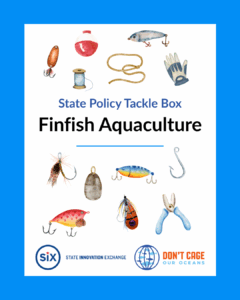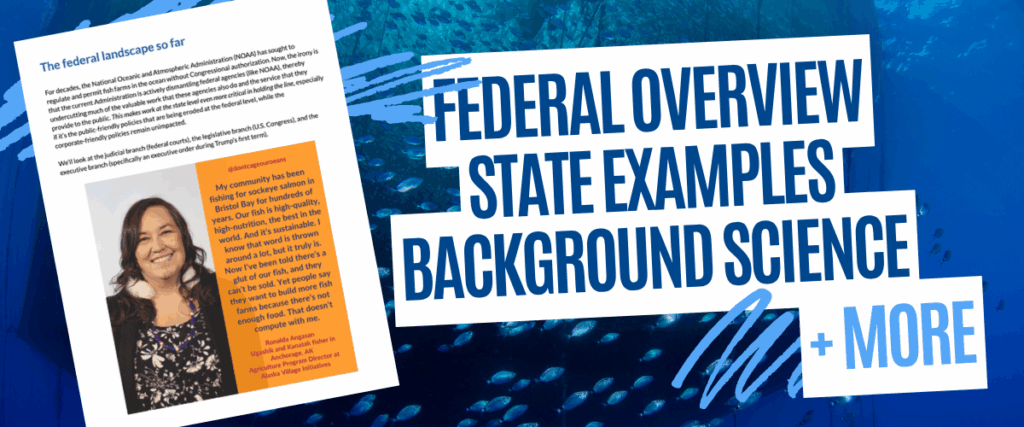SiX, in partnership with Don’t Cage Our Oceans (DCO2) is excited to announce the launch of a new resource for state legislators and advocates. The State Policy Tackle Box on Finfish Aquaculture provides policymakers and coastal communities with the resources, information, and tools they need to protect your coastal waters from the threat of industrial finfish farming, also known as commercial finfish net pen aquaculture, or ocean-based CAFOs (concentrated animal feeding operations).

Finfish aquaculture refers to the farming of fish species in controlled environments, such as ocean pens. This practice involves breeding, raising, and harvesting carnivorous fish for food. The most common species include salmon, tilapia, catfish, and trout.
This form of aquaculture is more akin to intensive factory farming of livestock on land, except in the ocean. It involves the rearing of hundreds of thousands of finfish in crowded, submersed net pens. These operations can stretch across hundreds of acres in the ocean. They are often backed by foreign or distant investors, have minimal community involvement or support, and employ an extractive agenda. The ocean becomes a dumping ground, with no compensation to the public or to nature. It is in stark contrast to more sustainable forms of aquaculture.
For more information on the dangers of industrial finfish aquaculture please check out our industrial aquaculture explainer here.

Included in this “tackle box” is background science, policy rationale, and examples of various types of legislative proposals.
To immediately gain access to the toolkit, please complete the form here (https://tinyurl.com/AquaTackleBox)
“In Alaska, like many coastal states, what is happening in our oceans influences everything about how we live. We need sustainable proposals that support healthy oceans, not extractive ones that take our resources and leave communities, people, and oceans harmed. As the former chair of our Fisheries Committee I used tools like this for policy examples, connections, and resources.”
- Geran Tarr, Former Alaska State Representative and Organizer with SiX
By helping to craft sound policy in conjunction with impacted communities, state legislators will be able to protect not only their state waters, but even prevent the development of finfish net pens in Federal waters that lie just beyond the state line, since any such facilities would also harm state residents.
“The fight to protect waters and local food systems from large-scale fish farming is ramping up in communities across the U.S. We keep hearing from state legislators who want to safeguard their residents’ livelihoods and keep their state waters from being polluted by the fecal, pathogenic, and toxic wastes emitted from net pens crammed full of farmed fish. This toolkit is designed to help these legislators better understand the issue, offering how-to guides along with sample state policies that illustrate how to protect residents from the socioeconomic and environmental harms caused by industrial-scale aquaculture.”
- James Mitchell, Legislative Director, Don’t Cage Our Oceans
The information in the tackle box is meant to inspire policymakers as they craft an appropriate response for their state, as there is no on-size-fits-all policy fix when it comes to finfish aquaculture. Most importantly, the toolkit is designed to provide policymakers with the resources to engage with, and support, values-based aquaculture practitioners and their ability to develop farmed seafood systems that benefit local economies and healthy marine ecosystems.
To immediately gain access to the toolkit, please complete the form here (https://tinyurl.com/AquaTackleBox)

